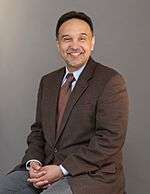Christopher Rose (electrical engineer)
| Christopher Rose | |
|---|---|
 | |
| Born | January 9, 1957 |
| Nationality | United States |
| Citizenship | United States |
| Alma mater | Massachusetts Institute of Technology |
| Awards | 2003 Marconi Prize Paper Award, IEEE Fellow |
| Scientific career | |
| Fields | Communication Theory |
| Institutions | Brown University |
Christopher Rose (born January 9, 1957) is a professor of engineering and associate dean of the faculty at Brown University in Rhode Island and a founding member of WINLAB at Rutgers University in New Jersey. He was educated at the Massachusetts Institute of Technology; SB'79, SM'81, Ph.D'85 all in Course VI (Electrical Engineering and Computer Science). On September 2, 2004, an article by Christopher Rose and Gregory Wright, titled Inscribed matter as an energy-efficient means of communication with an extraterrestrial civilization, appeared on the cover of Nature with the headline "Dear ET...".[1]
The article argued that wireless communication is an inefficient means for potential communication over interstellar distances owing to both the unavoidable reduction of signal strength as distance squared and that information can be densely encoded (inscribed) in matter. The article also suggested that information-bearing physical artifacts might be a more likely first form of contact with an extraterrestrial civilization than radio signals. Following the publication, Rose and Wright's idea was featured by a number of news sources including the BBC World Service, National Public Radio and The New York Times with an article by Dennis Overbye [2] and a subsequent editorial. [3]
Rose is an IEEE Fellow cited for "Contributions to Wireless Communication Systems Theory" and winner of the 2003 IEEE Marconi Prize Paper Award in wireless communications [4]
Christopher Rose was born in New York City and raised in Harlem and Co-op City. Related to Tricia Rose (sister).
Notes
- ↑ http://www.nature.com/nature/journal/v431/n7004/index.html
- ↑ Overbye, Dennis (September 2, 2004). "Sorry, E.T., but Parcel Post May Beat Phoning Home". The New York Times.
- ↑ "The Search for Livable Worlds". The New York Times. September 8, 2004.
- ↑ "IEEE Marconi Prize Paper Award in Wireless Communications". IEEE Communications Society. 2003.
External links
- Personal Homepage
- Inscribed matter as an energy-efficient means of communication with an extraterrestrial civilization, Christopher Rose & Gregory Wright, Nature 431, 47–49 (2004); doi:10.1038/nature02884
- Press coverage
- Marconi Prize Paper Awards Site